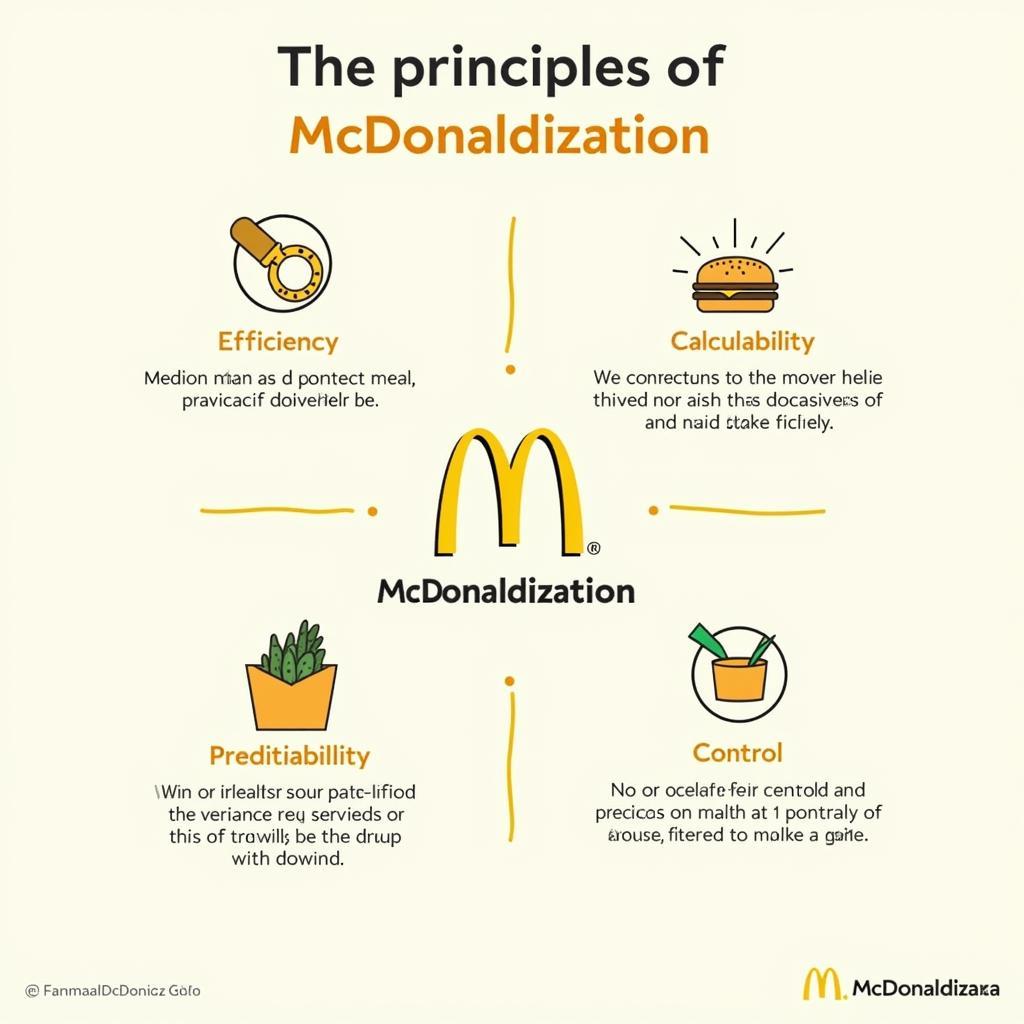The McDonaldization of society refers to the increasing presence of fast-food business principles in various aspects of our lives. This phenomenon, first described by sociologist George Ritzer, goes beyond just burgers and fries. It represents a broader shift in how we organize and experience everything from education and healthcare to entertainment and relationships. This article delves into the core principles of McDonaldization, explores its manifestations in modern society, and examines its implications for our global community.
What are the Core Principles of McDonaldization?
Ritzer identified four fundamental principles that characterize McDonaldization: efficiency, calculability, predictability, and control. These principles, while seemingly beneficial in a fast-paced world, can have unintended consequences.
- Efficiency: Streamlining processes to achieve the desired outcome in the quickest and simplest way possible. Think of drive-thrus, self-checkout kiosks, and online banking. While efficient, these systems can dehumanize interactions and limit individual choice.
- Calculability: Emphasis on quantifiable measures, such as speed of service, portion size, and cost. This focus on numbers can overshadow the quality of the product or experience. For instance, a larger portion size doesn’t necessarily equate to a better meal.
- Predictability: Ensuring uniformity and standardization across different locations and experiences. This means you know what to expect at a McDonald’s, whether you’re in New York or Tokyo. However, this predictability can lead to a lack of spontaneity and cultural diversity.
- Control: Replacing human labor with technology and standardized procedures. Automated ordering systems, pre-portioned ingredients, and scripted customer service interactions are all examples of control. While this increases efficiency and reduces human error, it can also limit creativity and personal connection.
 Mcdonaldization Principles Illustrated
Mcdonaldization Principles Illustrated
How Does McDonaldization Manifest in Society?
The influence of McDonaldization extends far beyond the fast-food industry. Its principles are evident in various sectors:
Education:
- Standardized testing emphasizes calculability and often prioritizes rote memorization over critical thinking.
- Online learning platforms offer efficiency but can lack the personalized interaction of traditional classrooms.
Healthcare:
- Walk-in clinics prioritize efficiency and speed, often at the expense of comprehensive patient care.
- Standardized medical procedures enhance predictability but can limit individualized treatment.
Entertainment:
- Streaming services provide on-demand entertainment, prioritizing efficiency and calculability through algorithms and recommendations.
- Blockbuster movies often follow predictable formulas, prioritizing profitability over artistic innovation.
 Examples of McDonaldization Across Industries
Examples of McDonaldization Across Industries
What is the Impact of McDonaldization on Our Global Community?
The McDonaldization of society has far-reaching consequences, impacting both individuals and communities.
Loss of Cultural Diversity:
The emphasis on standardization can lead to a homogenization of culture, where local traditions and unique experiences are replaced by globalized, standardized offerings.
Decreased Human Interaction:
Automation and standardized procedures can reduce human interaction, leading to a sense of alienation and detachment.
Focus on Quantity over Quality:
The emphasis on calculability can prioritize quantity over quality, leading to a decline in craftsmanship and personalized service.
“The irony of McDonaldization is that in seeking to create the perfect system, we often lose the very things that make life meaningful: human connection, spontaneity, and authentic experiences,” says Dr. Emily Carter, a sociologist specializing in consumer culture.
Can We Resist McDonaldization?
While McDonaldization is a powerful force, it’s not inevitable. By supporting local businesses, embracing diversity, and prioritizing quality over quantity, we can create a more balanced and fulfilling world.
Conclusion
The McDonaldization of society refers to a complex phenomenon with both benefits and drawbacks. Understanding its principles and impact allows us to make informed choices about how we engage with the world around us and strive for a more balanced and harmonious future.
FAQs
- What is the main idea behind McDonaldization? The main idea is the increasing influence of fast-food business principles on various aspects of society.
- Who coined the term “McDonaldization”? Sociologist George Ritzer coined the term.
- What are the negative effects of McDonaldization? Negative effects include a loss of cultural diversity, decreased human interaction, and a focus on quantity over quality.
- Is McDonaldization always a bad thing? Not necessarily, as it can offer efficiency and predictability in some situations.
- How can we resist McDonaldization? We can resist by supporting local businesses, embracing diversity, and prioritizing quality over quantity.
- What are some examples of McDonaldization in everyday life? Examples include self-checkout kiosks, online learning platforms, and standardized testing.
- How does McDonaldization affect our culture? It can lead to a homogenization of culture, with globalized brands replacing local traditions.
“We must be mindful of the trade-offs between efficiency and human connection,” adds Dr. Carter. “A world solely focused on speed and convenience risks losing its soul.”
Professor Michael Davis, an expert in urban planning, observes, “The challenge lies in finding a balance between the benefits of standardization and the importance of preserving cultural diversity and human interaction.”
Need help?
Contact us! Phone: 02043854663, Email: [email protected] Or visit us at: Zone 34, Bac Giang, 260000, Vietnam. We have a 24/7 customer service team.